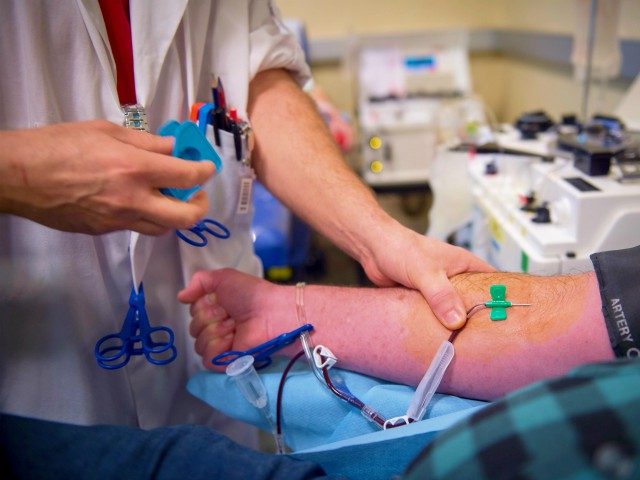The U.S. Food and Drug Administration issued new guidance easing restrictions on gay men donating blood.
After a 60-day public comment period, the rule is expected to take effect.
Gay men have in large part been prohibited from donating blood since the AIDS epidemic in the 1980s, for fear of contaminating the U.S. blood supply with HIV. The FDA has been easing restrictions over time since.
The FDA is “proposing a change from time-based deferrals to assessing blood donor eligibility using gender-inclusive, individual risk-based questions to reduce the risk of transfusion-transmitted HIV.” That is a change the government says is similar to practices in the United Kingdom and Canada.
“Whether it’s for someone involved in a car accident, or for an individual with a life-threatening illness, blood donations save lives every day,” FDA Commissioner Robert M. Califf, M.D., said. “Maintaining a safe and adequate supply of blood and blood products in the U.S. is paramount for the FDA, and this proposal for an individual risk assessment, regardless of gender or sexual orientation, will enable us to continue using the best science to do so.”
New guidance proposes to eliminate time-based deferrals for “men who have sex with men” and women who have sex with those men.
There will also be an updated questionnaire for potential donors that will ask about “new or multiple sexual partners in the past three months.” Prospective donors who have new or multiple sexual partners in that timeframe would then be asked about history of anal sex. Those who have had anal sex with new or multiple partners in the three-month timeframe would be deferred for blood donation.
Gay men who take pre-exposure prophylaxis (PrEP) or post-exposure prophylaxis (PEP) orally will also be deferred three months from their last dose. Men who use injectable PrEP would be deferred for two years from their last dose. Both of these medications have shown the potential to delay a positive HIV test result, which can present as a false negative in blood donations.
The guidance would continue to ban all persons who have tested positive for HIV, and blood donations will continue to be tested for “transfusion-transmitted” infections like HIV, hepatitis B, and hepatitis C.
“Our approach to this work has always been, and will continue to be, based on the best available science and data,” FDA Center for Biologics Evaluation and Research director Peter Marks, M.D., Ph.D., said. “Over the years, this data-driven process has enabled us to revise our policies thereby increasing those eligible to donate blood while maintaining appropriate safeguards to protect recipients.”
“We will continue to follow the best available scientific evidence to maintain an adequate supply of blood and minimize the risk of transmitting infectious diseases and are committed to finalizing this draft guidance as quickly as possible,” Marks concluded.
Breccan F. Thies is a reporter for Breitbart News. You can follow him on Twitter @BreccanFThies.

COMMENTS
Please let us know if you're having issues with commenting.